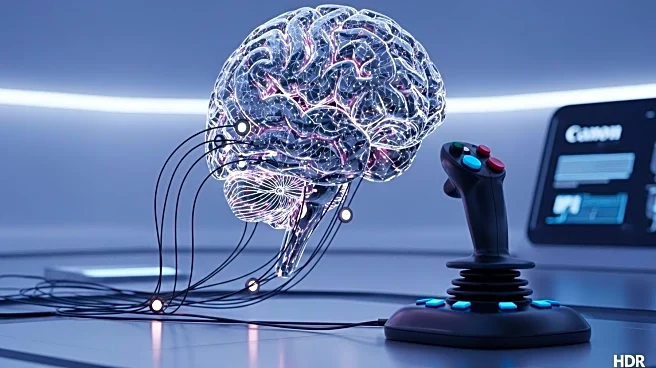What is the story about?
What's Happening?
Researchers Dr. Jennifer Corbett and Dr. Jaap Munneke at Brunel University London have conducted a study to understand why gamers choose inverted controls over normal settings. The study, titled 'Why axis inversion? Optimising interactions between users, interfaces, and visual displays in 3D environments,' explores the neuroscience behind this preference. The research was initiated during lockdown and published recently, revealing that personal experiences, favorite games, different genres, age, and console types influence this choice. Participants were asked to complete a questionnaire and partake in experiments around spatial awareness, including tasks like mentally rotating shapes and overcoming the 'Simon effect.' The study found that the speed at which gamers could mentally rotate objects and overcome the Simon effect was a significant factor in their control preference.
Why It's Important?
This study sheds light on the cognitive processes involved in gaming, potentially influencing how game developers design user interfaces. Understanding the neuroscience behind control preferences can lead to more personalized gaming experiences, enhancing user satisfaction and performance. The findings suggest that gamers who switch their control preferences might improve their gaming skills, offering insights into cognitive flexibility and learning. This research could impact the gaming industry by encouraging developers to consider diverse control settings and cater to different cognitive styles, ultimately benefiting both casual and professional gamers.
What's Next?
The study encourages gamers to experiment with different control settings, suggesting that switching preferences could enhance gaming performance. This could lead to a broader acceptance of varied control options in the gaming community. Developers might integrate more customizable control settings in future games, allowing players to optimize their gaming experience based on cognitive preferences. The research could also inspire further studies into the relationship between cognitive processes and gaming, potentially influencing educational tools and training programs that utilize gaming technology.
Beyond the Headlines
The study touches on broader themes of cognitive flexibility and learning, drawing parallels with historical practices like forcing left-handed individuals to write with their right hand. This highlights the importance of accommodating diverse cognitive styles in various fields, not just gaming. The research suggests that embracing cognitive diversity can lead to better outcomes in learning and performance, offering insights that could extend beyond gaming to areas like education and workplace training.















